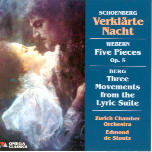Music for strings from the Viennese modern school is the menu for this CD. Schoenberg’s voluptuous Verklärte Nacht is balanced by the more acerbic Webern pieces and the nightmarish, reflective Berg movements, arranged by the composer for string orchestra from the original string quartet score. The Swiss musicians play with great energy and good articulation for conductor Edmond de Stoutz, and their approach works well for the Webern and Berg suites. The Schoenberg, however, needs more beautiful tone to make a proper impression. The playing here, though obviously impassioned, sounds a little raw and overly aggressive. This impression is heightened, perhaps even created, by a recording that is very forward and in your face, an almost microscopic aural perspective. The alternative recommended Karajan recordings are available from Musical Heritage Society in an attractively-priced three-CD set that includes most of these composers’ other well-known compositions. It’s about all of the Vienna School that the average listener will need.
































